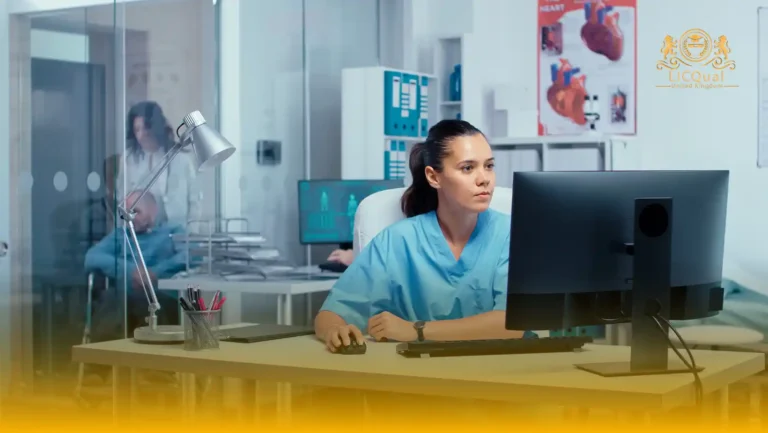The LICQual Level 3 Diploma in Pediatric Surgery (Dip PS) is a specialised qualification designed for healthcare professionals seeking to advance their expertise in surgical care for children. This programme is intended for learners who already possess a foundation in healthcare or surgical practice and wish to enhance their career prospects, expand their clinical knowledge, and strengthen their Continuing Professional Development (CPD).
The course provides comprehensive coverage of paediatric surgical principles, including patient assessment, pre-operative and post-operative care, surgical techniques, and the management of congenital and acquired conditions in children. Learners will gain practical insights, develop critical decision-making skills, and acquire the competence to support and assist in complex paediatric surgical procedures, ensuring optimal outcomes for young patients.
To ensure high-quality training and learner success, centres delivering this qualification must have competent and qualified staff with professional experience in paediatric surgery or related healthcare fields. Centres should also provide access to comprehensive learning materials, clinical resources, and surgical facilities, enabling learners to gain hands-on experience under professional supervision.
By completing the LICQual Level 3 Diploma in Pediatric Surgery, learners enhance their professional credibility and are prepared to take on advanced responsibilities in paediatric surgical teams, hospitals, and specialist clinics. This qualification is ideal for dedicated healthcare professionals who aim to make a meaningful impact on the surgical care of children, develop specialised skills, and stay at the forefront of paediatric surgical practice.
Course Overview
Qualification Title
LICQual Level 3 Diploma in Pediatric Surgery (Dip PS)
Total Units
6
Total Credits
60
GLH
240
Qualification #
LICQ2200907
Qualification Specification
To enroll in the LICQual Level 3 Diploma in Pediatric Surgery (Dip PS), applicants must meet the following criteria:
|
Qualification# |
Unit Title |
Credits |
GLH |
|---|---|---|---|
|
LICQ2200907-1 |
Introduction to Pediatric Surgery |
10 |
40 |
|
LICQ2200907-2 |
Pre-operative Assessment and Preparation |
10 |
40 |
|
LICQ2200907-3 |
Surgical Techniques and Procedures in Children |
10 |
40 |
|
LICQ2200907-4 |
Post-operative Care and Pediatric Patient Management |
10 |
40 |
|
LICQ2200907-5 |
Advanced Pediatric Pathophysiology and Research |
10 |
40 |
|
LICQ2200907-6 |
Professional Practice and CPD in Pediatric Surgery |
10 |
40 |
By the end of this course, learners will be able to:
Unit 1: Introduction to Pediatric Surgery
By the end of this unit, learners will be able to:
- Explain the anatomy and physiology of children relevant to surgical practice.
- Describe the fundamental principles and scope of pediatric surgery.
- Identify common congenital and acquired surgical conditions in children.
- Discuss the role of pediatric surgery in improving health outcomes for young patients.
Unit 2: Pre-operative Assessment and Preparation
By the end of this unit, learners will be able to:
- Conduct comprehensive pre-operative assessments for paediatric patients.
- Interpret diagnostic test results and identify surgical risk factors.
- Apply preparation protocols to ensure paediatric patient safety before surgery.
- Develop evidence-based pre-operative care plans tailored to individual patients.
Unit 3: Surgical Techniques and Procedures in Children
By the end of this unit, learners will be able to:
- Describe standard and advanced paediatric surgical techniques.
- Demonstrate knowledge of surgical instruments and equipment used in pediatric surgery.
- Explain procedural protocols and safety measures in the operating theatre.
- Analyse surgical approaches to optimise patient outcomes in paediatric surgery.
Unit 4: Post-operative Care and Pediatric Patient Management
By the end of this unit, learners will be able to:
- Monitor paediatric patients effectively following surgery.
- Recognise and manage common post-operative complications in children.
- Apply pain management and rehabilitation strategies to support recovery.
- Implement patient safety and infection control measures in post-operative care.
Unit 5: Advanced Pediatric Pathophysiology and Research
By the end of this unit, learners will be able to:
- Explain advanced concepts in paediatric disease mechanisms.
- Evaluate current research and emerging trends in paediatric surgery.
- Apply evidence-based practices to improve patient care and surgical outcomes.
- Critically assess treatment strategies for complex paediatric conditions.
Unit 6: Professional Practice and CPD in Pediatric Surgery
By the end of this unit, learners will be able to:
- Demonstrate professional and ethical responsibilities in paediatric surgical practice.
- Apply principles of clinical governance and multidisciplinary teamwork.
- Develop a personal Continuing Professional Development (CPD) plan to enhance knowledge and skills.
- Reflect on clinical practice to identify areas for improvement and professional growth.
The LICQual Level 3 Diploma in Pediatric Surgery (Dip PS) is designed for healthcare professionals, medical graduates, and allied practitioners who want to specialize in surgical care for children. This CPD-accredited diploma is ideal for those seeking international recognition, career advancement, and flexible online training that equips them with evidence-based knowledge in congenital and acquired pediatric conditions, surgical techniques, and child-centered care.
1. Medical Doctors and Surgeons
- Strengthen diagnostic and surgical skills in pediatric procedures
- Gain advanced knowledge of congenital and acquired pediatric conditions
- Apply evidence-based approaches to neonatal and child surgery
- Improve patient outcomes with specialized pediatric surgical training
- Enhance professional credibility with an accredited diploma
2. Pediatric Nurses and Clinical Practitioners
- Develop expertise in perioperative and post-operative pediatric care
- Learn advanced monitoring and recovery strategies for children
- Expand clinical scope with a Diploma in Pediatric Surgery (Dip PS)
- Access CPD-accredited training for career progression
- Gain confidence in supporting surgical teams in pediatric units
3. Allied Health Professionals
- Suitable for anesthetists, surgical technologists, and perfusionists
- Understand the role of multidisciplinary teams in pediatric surgery
- Support children through recovery and rehabilitation phases
- Strengthen interprofessional collaboration in surgical environments
- Add a specialized qualification to enhance career opportunities
4. Medical Graduates and Postgraduate Students
- Build a strong foundation in pediatric surgery for future specialization
- Gain a competitive edge in postgraduate surgical applications
- Access flexible online learning while continuing clinical rotations
- Learn from expert-led modules aligned with international standards
- Earn a diploma that strengthens both academic and professional profiles
5. Public Health Specialists and Researchers
- Understand the global impact of pediatric surgical conditions
- Gain insights into prevention, screening, and surgical innovation
- Learn about population-level interventions for child health
- Strengthen leadership skills in healthcare policy and planning
- Contribute to international pediatric surgery research initiatives
6. International Healthcare Professionals
- Designed for global learners seeking UK-accredited qualifications
- Access flexible online study from anywhere in the world
- Gain recognition with an internationally respected diploma
- Learn best practices in pediatric surgery aligned with global standards
- Enhance employability in hospitals, surgical centers, and NGOs worldwide
7. Professionals Seeking Career Advancement
- Ideal for those aiming to specialize in pediatric surgery
- Boost career growth with a niche surgical qualification
- Gain recognition for advanced expertise in child surgical care
- Open pathways to leadership, teaching, and research roles
- Strengthen your CV with a Diploma in Pediatric Surgery (Dip PS)
To deliver the LICQual Level 3 Diploma in Pediatric Surgery effectively, centres must meet specific standards to ensure high-quality training, practical learning, and learner success. The requirements include:
- Qualified and Competent Staff: Centres must employ instructors with relevant qualifications, clinical experience in paediatric surgery, and expertise in delivering Level 3 healthcare programmes. Staff should be capable of providing both theoretical instruction and practical guidance.
- Comprehensive Learning Resources: Centres should provide up-to-date textbooks, digital learning materials, case studies, and access to current research in paediatric surgery to support effective learning.
- Practical Facilities and Equipment: Centres must have access to paediatric surgical facilities, operating theatre environments, and clinical equipment to provide learners with hands-on experience in pre-operative, operative, and post-operative care.
- Safe and Accessible Learning Environment: Training areas must comply with health and safety standards, offering a secure, clean, and fully accessible environment for all learners.
- Assessment and Quality Assurance Processes: Centres should implement robust assessment strategies, feedback mechanisms, and quality assurance systems to maintain high academic and professional standards.
- Support for CPD and Professional Development: Centres must encourage learners to engage in Continuing Professional Development through workshops, seminars, and additional learning opportunities relevant to paediatric surgery.
- Administrative and Logistical Support: Centres must provide efficient enrolment, record-keeping, and learner support services to guide learners throughout their course journey.
Meeting these centre requirements ensures learners receive a high-quality, structured, and professionally recognised Level 3 qualification, equipping them with the knowledge, skills, and confidence to advance in paediatric surgical practice and deliver expert care to young patients.
Assessment and Verification
All units within this qualification are subject to internal assessment by the approved centre and external verification by LICQual. The qualification follows a criterion-referenced assessment approach, ensuring that learners meet all specified learning outcomes.
To achieve a ‘Pass’ in any unit, learners must provide valid, sufficient, and authentic evidence demonstrating their attainment of all learning outcomes and compliance with the prescribed assessment criteria. The Assessor is responsible for evaluating the evidence and determining whether the learner has successfully met the required standards.
Assessors must maintain a clear and comprehensive audit trail, documenting the basis for their assessment decisions to ensure transparency, consistency, and compliance with quality assurance requirements.







